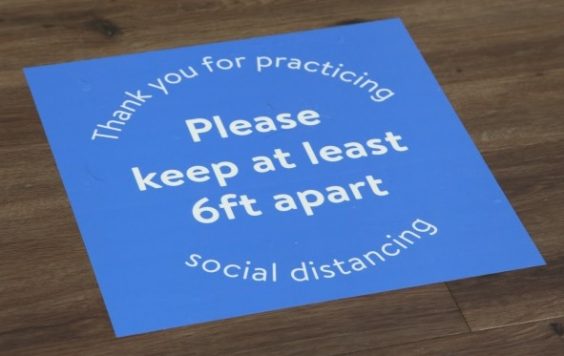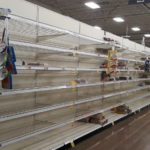
Since mid-March, most of us have barely left the house, only venturing out to the grocery store if we – and the store – were taking lots of precautions.
Well, we’ve made it to June. So how concerned are we about safety now?
Maybe not quite so much. If it seems you’ve seen more people in the grocery store, and fewer of them wearing masks, keeping their distance or paying attention to those one-way aisles – it’s not your imagination.
A new survey by the International Food Information Council finds that fewer of us are taking the same precautions when grocery shopping as we were during the earlier days of the coronavirus pandemic. And the survey was conducted a few weeks ago – which means today’s figures could be even lower.
Only about half of shoppers questioned in the most recent survey said they wash their hands after going to the grocery store, down from two-thirds who did so when last asked in early April. About a half wear a mask when grocery shopping. And fewer still try to minimize the surfaces they touch, use sanitizers or clean their food packages before putting them away.
“Since April, there has been a consistent downturn in following risk-reducing practices related to COVID-19 and grocery shopping,” IFIC noted. That’s particularly true among younger shoppers, as “those in the youngest age bracket (less than 45 years of age) are less apt to follow many risk-reducing precautions compared with people older than 45.”
The sales and marketing company Acosta conducted its own survey, however, and found that two-thirds of grocery shoppers are still wearing masks, and washing hands or using hand sanitizer after shopping, leading it to declare that “hand sanitizing and wearing a mask may become a permanent part of the shopping routine” – a conclusion that IFIC and its own survey respondents might dispute.
IFIC’s survey also found that shoppers aren’t as concerned about safety measures that their stores are taking. While a third said they’d feel better if store employees wore masks, that was the only answer that more people gave in May than in April. Every other safety measure cited by shoppers declined in importance, from frequently wiping down surfaces in the store, employees wearing gloves, and having stores provide wipes or hand sanitizers for customers.
A separate survey by the consumer market research firm Magid found that most shoppers didn’t think their stores were doing a great job with safety measures anyway. Just 41% surveyed in May said most retailers in general were doing “extremely” or “very” well handling health concerns and adapting to changes in shoppers’ needs. Amazon did the best, with 41% having a favorable view of their coronavirus response, while Rite Aid, Albertsons and Dollar Tree were at the bottom of the list, praised by only about 20% each.
Some of the changes in shoppers’ behavior, and the expectations they have of their stores, could be due to complacency and a desire to just get back to normal already. Others could be due to changing guidance – public health officials ultimately advised that washing your grocery packages wasn’t really necessary, for example. When it comes to masks, more people are asking questions about whether wearing masks in public does much to protect them and others. And some stores are even bucking quickly-adopted trends that others have instituted – H-E-B, for example, held firm in not offering seniors-only shopping hours. And Giant gave up on one-way aisles, after customers complained they were unnecessary and counterproductive.
If anything has changed for the better that we can all agree about, it’s that stores are more well-stocked now, and we’re more confident in the safety of the food supply.
“The way we’re thinking and acting around food and food safety continues to evolve,” IFIC offered in summary. And someday, hopefully, we can evolve to a point where getting sick because you went to the grocery store, isn’t something you have to worry about anymore.
Image source: Walmart










